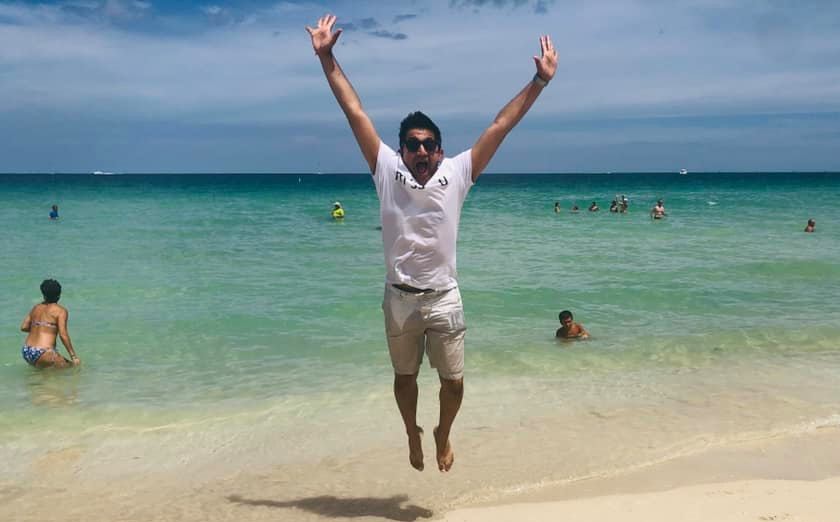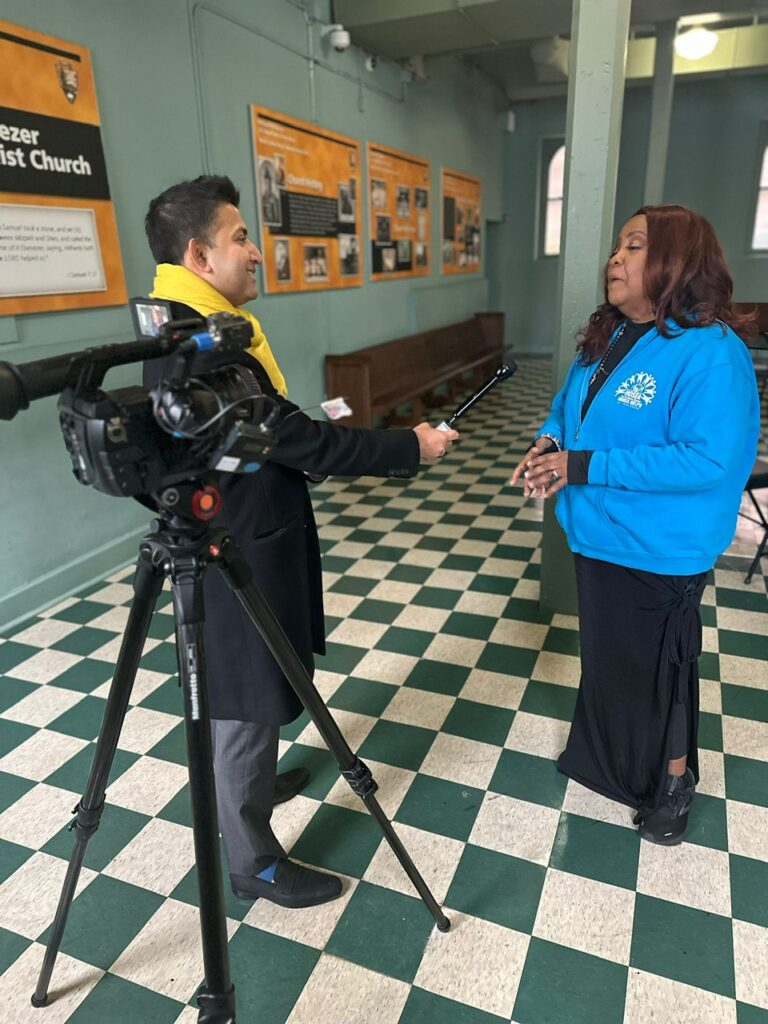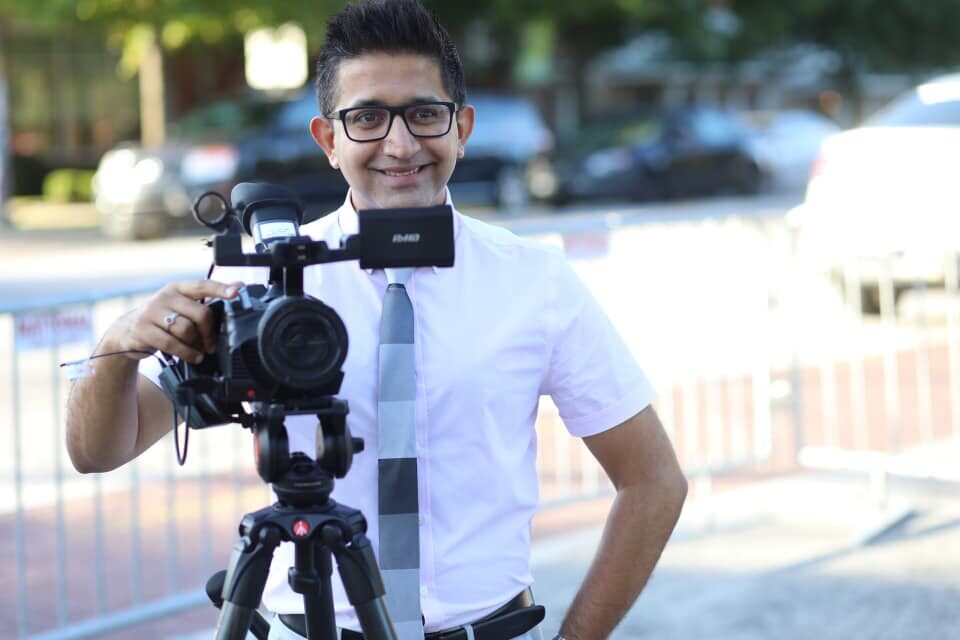BY JYOTHSNA HEGDE
Atlanta, GA, February 6, 2023: “We are not defined by our eye color or hair color. We are not defined by our height or weight. We are not defined by our religion or race. We are not defined by our food preferences or the beverages we drink. So why should we be defined by our sexual orientation? It is one element of our personality but should not and cannot define us. We are beautiful human beings with many ingredients. We don’t care if someone is left-handed or right-handed. We don’t sit and analyze if someone prefers beaches or mountains. We could care less if someone prefers South Indian food or North Indian food. So why do we spend so much time and energy worrying about who we find attractive? It is an element of us but does not define us,” Archith Seshadri pondered in his exclusive with NRI Pulse. We dug deep to find out.
After famously reinventing his career from a consultant at Accenture to broadcast journalism, Archith Seshadri now serves as the Atlanta Bureau Chief for Nexstar Media Group where he works as an anchor/reporter for several Georgia TV stations. Outside of TV news, Seshadri is an actor, host, yoga teacher and food blogger. Seshadri has also appeared on ABC’s Pyramid, teaming up with rapper Snoop Dogg.
Forever perched on the branches of hope and enthusiasm, Seshadri has never held back when it came time to tread the path less traveled. Be it reinventing his career path, professionally, or personally accepting his sexual orientation as a gay man, Seshadri rose up to the occasion and the challenges along the way. He, in fact chose to come out publicly in an interview, a medium he is all too familiar and comfortable with.
Coming out, they say, is not a moment in time but a process. Seshadri had his too. As a Tamil Brahmin and the eldest son of the family, backed with a highly successful career placed him at the top ranks in the Indian marriage scene.

“When you come from a traditional South Indian Tamil Brahmin family, your roadmap is laid out for you. You go to school, you get good grades, you go to college, you get a degree, wife, kids,” Seshadri notes. Focused on his career in his twenties, Seshadri was simply clueless about his sexual preferences. He recalls August of 2001, when he was a freshman at Georgia Tech and his first assignment for a newspaper article was to cover a National Coming Out Day. At the time he simply didn’t know himself!
The real doubts started to creep in when his parents started setting him up with prospective brides. “I didn’t know for sure if I was gay or if it was a phase or if I was feeling this way because I hadn’t found someone. My aha lightbulb moment was – I’m not going to get married if there’s even an inclination of doubt. It is not fair to them. Why put someone else through your insecurity, right?”
“I don’t think I knew who I was until I was in my 30s,” Seshadri notes. When unsettling emotions engulfed him, Seshadri decided to analyze himself more. In his pursuit of self-realization, he headed to India and lived alone in Delhi and returned. It was however during the pandemic in 2020, when he had “a lot of time at home to reflect and process” information that things cleared up for him.
“The pandemic also made me realize that you only get one life to live, and you should be able to live it as you wish,” Seshadri notes. When the doubts about his orientation were clear to him, the next big step was relaying it to family and friends.
“The thing that made it difficult was my own overwhelming guilt. My parents are the two most important people in my life, and I didn’t want to disappoint them,” Seshadri said. The guilt mostly arose knowing that his parents had been looking out for alliances and had been eager to see their first born settled with a family of his own. The mounting pressure of eluding their earnest matchmaking efforts only fueled his guilt further. Having spent many sleepless nights and rehearsals about how he would talk to his parents, Seshadri decided that around his dad’s birthday in 2020, at the end of the year and Christmas time was the time he would break the news. Earlier in the year, around his birthday in October, he had spoken about it to his brother and close friends. When Seshadri initially pulled his mom to the basement, she thought he had found someone and/or was going to get married.
“My brother was and has been very supportive,” Seshadri said. While his mom did not comprehend the concept of LGBTQ completely, his dad listened as Seshadri went on explain that he was interested in boys and not girls. “We don’t know anyone like this in our family,” was their initial reaction.

This initial reaction, Seshadri said, was one of the reasons he decided to go public about his orientation. “I also couldn’t give them any examples they could relate to, back in India.” Going public, Seshadri believes will help future generations normalize conversations about LGBTQ community and also help someone in his situation. “My job as a journalist is to tell stories. And I am grateful to be in a field where I can share my own story.”
His arduous path to self-discovery was bittersweet with the clarity of knowing who he was and the internal turmoil of getting to the place of clarity. How did he get there?
For someone who was unaware of his homosexuality is in 20s, his innate reluctance to get married or be set up by his parents in his 30s was disturbing. And he had to find out the reason. Seshadri found his answers through yoga, improv and acting. “There’s a coaching rule that says make a choice – black or white, yes or no? Are you happy?” Seshadri notes, that empowers you to make a choice. “Because if you don’t, someone else is going to make it for you.” Acting and Improv, he observes, helped him too. Yoga and meditation with no phone, and no connection to the outer world with just the teacher’s voice, and a set intention to sit there closing his eyes to meditate, Seshadri says has a healing power. “It lets you learn to love yourself and accept who you are.”
“I was clear that I am not going to misrepresent myself, I am not going to ruin someone’s life. I had to be authentic. Now, when I meet someone new, I share my journey and normalize the conversation. My orientation is one part of me, but it does not define me. “
“Find out the things you are good at- at least 3 things you know you are good at. And try to use it for the greater good and impact the world. Look at the problems of the world and try to figure out if you can be part of the solution. Or create something,” is Seshadri’s message for the world.

ACCEPTANCE/AUTHENTICITY, VULNERABILITY, VISIBILITY
“If you are straight, it does not mean you can’t be anything else. We don’t have a party for coming out as straight, so we don’t need to for coming out as gay or lesbian or belonging to the LGTBQ family. Hopefully, in a few years, no one has to worry about “coming out” and people can just live, let go, and be accepting,” Seshadri remarked.
“Equality means more than passing laws. The struggle is really won in the hearts and minds of our communities,” Barbara Gittings, prominent American activist for LGBT equality famously quoted.
While political wins play a significant role for the LGBTQ+ community, true LGBTQ acceptance runs deeper. The real struggle, as Gittings noted, is addressed when the LGBTQ community feels respected, acknowledged, and valued by their families, peers and at their workplaces.
Pew Research indicates positive data that 72% of Americans now agree that homosexuality should be accepted by society — vs. just 42% who agreed in 2007.
Acceptance, however, still has a long way to go. State lawmakers proposed a record 238 bills in 2022 that would limit the rights of LGBTQ Americans, with about half of them targeting transgender people specifically. As per a 2019 Yale School of Public Health study, an estimated 83 percent of those who identify as lesbian, gay or bisexual — keep their orientation hidden from all or most of the people in their lives.
Why is acceptance / being authentic important? Concealing one’s sexual orientation can lead to significant mental and physical health issues, increased healthcare costs and a dampening of the public visibility necessary for advancing equal rights, said John Pachankis, Ph.D., associate professor at the Yale School of Public Health, in an article published by the university.
What is an ideal LGBTQ acceptance? Much like any other form of social acceptance, the LGBTQ community would feel accepted when loved by family and friends, respected at work, feel safe to be true to who they are, have equal access to healthcare, housing, and work opportunities. Just as we celebrate diversity, society needs to find ways to be an ally and advocate for this community and join the fight against discrimination. But mostly making them feel like they belong.
“Sometimes I think it’s important that everyone find those people or opportunities to share your vulnerable side instead of putting up the guard, because it is only when we shed those fears and inhibitions, that you get to see the real person,” Seshadri said.
Sharing something so personal and not knowing how someone will react requires a component of vulnerability. That element of the unknown can create fear and can even serve as a powerful force for silence. And yet, hiding one’s identity also requires vulnerability. Not being true to oneself can be demoralizing and a strenuous experience.
Vulnerability and visibility are greatly entwined for the LGBTQ+ community. Prior to the June 2020 Supreme Court decision affirming that LGBTQ+ workers are protected from discrimination under the Civil Rights Act of 1964, invisibility meant inclusion and safety, whereas visibility could have led to exclusion and sometimes physical danger.
Being visible requires vulnerability. The honesty and clarity of self that comes with visibility provides a platform for authentic interactions and relationships with others. When LGBTQ+ people, such as Seshadri are visible, especially in leadership and public roles, it can help others feel safe to be open about their identity.
LGBTQ REPRESENTATION IN THE WORLD OF CINEMA AND ITS ROLE IN NORMALIZING THE CONVERSATION.
“I am very happy to see more LGBTQ storylines in mainstream media and movies such Chandigarh Kare Aashiqui,” Seshadri, an actor himself, notes, adding, that the role of cinema is immense in shaping public sentiments.
Indeed, it is. Great storytelling has the power to change even the most entrenched of mindsets. When Will and Grace first aired in 1996, it immediately challenged one of taboos in American society: same sex relationships. In 246 episodes the sitcom managed to break taboos by normalizing LGBTQ+ representation. The show is rightly credited as having a profound positive impact on the American public’s attitude towards gay people. Such was its influence in changing people’s views that social scientists labelled the phenomenon ‘The Will & Grace Effect’.
From 1934 to 1968, the Motion Picture Producers and Distributors of America implemented the Motion Picture Production Code, a.k.a. the Hays Code, which regulated what was considered morally appropriate to show moviegoers. The most harmful policy was the ban on depictions of same-sex relationships. So, until the early ’70s, when they began implementing the ratings system, the LGBTQ+ community was largely unrepresented in films across America.
Over the years, the film industry has made leaps and bounds in improving representation of the LGBTQ+ community. According to GLAAD (Gay & Lesbian Alliance Against Defamation), of the 77 films released theatrically in 2021, 16 (20.8 percent) featured characters who were explicitly LGBTQ. Nineteen of the 28 queer characters from said films were male, nine were women, and none were non-binary. A single character — Anybodys (iris means) in “West Side Story” — was trans, the first time a trans character appeared in a major studio theatrical release in five years.
Cricket and Cinema are in integral part of Indian way of life and cinema plays a mammoth role in conditioning the mindset of society. From Hindi movie Badnaam Basti (Infamous Neighborhood) in 1971 dubbed as India’s first gay film disappearing into oblivion soon after its release, to films like Badhaai Do, Subh Mangal Zyada Saavdhan, Chandigarh Kare Aashiqui, Maja Ma, Ek Ladki Ko Dekha Toh Aisa Laga, India has come a long way. These movies have not only imparted positive impact but also paved way towards normalizing conversations.
PRIDE MONTH – THE HISTORY AND SIGNIFICANCE
Pride Month is currently celebrated each year in June to honor the 1969
Stonewall Uprising in Manhattan. The Stonewall Uprising was a tipping point for
the Gay Liberation Movement in the United States.
On a hot summer’s night of June 28, 1969, in New York, police raided the Stonewall Inn, a gay club in Greenwich Village, which resulted in bar patrons, staff, and neighborhood residents rioting onto Christopher Street outside. Marsha P. Johnson led the protest demanding establishment of places where LGBT+ people could go and be open about their sexual orientation without fear of arrest.
Known as ’The Mother of Pride,’ Brenda Howard is credited for initiating the Pride Month. She organized Gay Pride Week and the Christopher Street Liberation Day Parade a year after the Stonewall Riots, which morphed into what we now know as the New York City Pride March and was the catalyst for the formation of similar parades and marches across the world.
Gay politician Harvey Milk’s talented friend Gilbert Baker designed the rainbow flag for San Francisco’s Pride March in 1978. Sadly, Harvey Milk was assassinated along with Mayor George Moscone on November 23, 1978, in San Francisco City Hall by Dan White.
Bill Clinton was the first U.S. President to officially recognize Pride Month in 1999 and 2000. Barack Obama declared June LGBT Pride Month from 2009 to 2016. In May 2019, Donald Trump recognized Pride Month with a tweet announcing that his administration had launched a global campaign to decriminalize homosexuality. President Biden has warned against a recent rise in violence and hate against LGBTQ people.
It is 2023 and it is still not illegal to discriminate against LGTBQ+ individuals in employment in 27 states. Identity/self-affirmation is so important, but there are still laws, among other widespread stigmas, that make it particularly difficult for some.
“As human beings, we should spend our time cultivating our skills, spreading our kindness and sharing our love. Please don’t ask other people who they prefer (boys, girls, both, neither, etc…). It is such a personal question and frankly no one’s business. If someone chooses to share, that’s great but respect those intimate conversations. Your biggest gift and strength will be an ally, support system, and confidante to those who love you!,” Seshadri appeals. Let us follow suit.
Overcoming his own fears and vulnerabilities, Seshadri, the journalist, has made a sincere effort to accept and stay authentic to his true story, privately, and publicly. For many South Asian families struggling with comprehending the meaning of LQGTQ and looking for someone similar, Seshadri has set an example openly. Perhaps his hearty acceptance and positive outlook could impart the Will & Grace Effect amongst the Indian diaspora across the world. Time will tell.
ADDITIONAL RESOURCES:
Local:
Atlanta Q and A (Queer and Asian)
https://www.facebookh.com/ATLQandA/
ttps://www.instagram.com/atl.qna/
Ga Safe School Schools Coalition
https://gasafeschools.org/
PFLAG Atlanta
https://www.pflagatlanta.org/
For Straights Only Video
https://www.youtube.com/watch?v=jMvfkzgzK0c
National:
Desi Rainbow Parents and Allies
https://www.desirainbow.org/
National Queer Asian Pacific Islander Alliance
https://www.nqapia.org/
DESI LGBTQ+ SOUTH ASIAN HOTLINE
HTTPS://WWW.DEQH.ORG/





